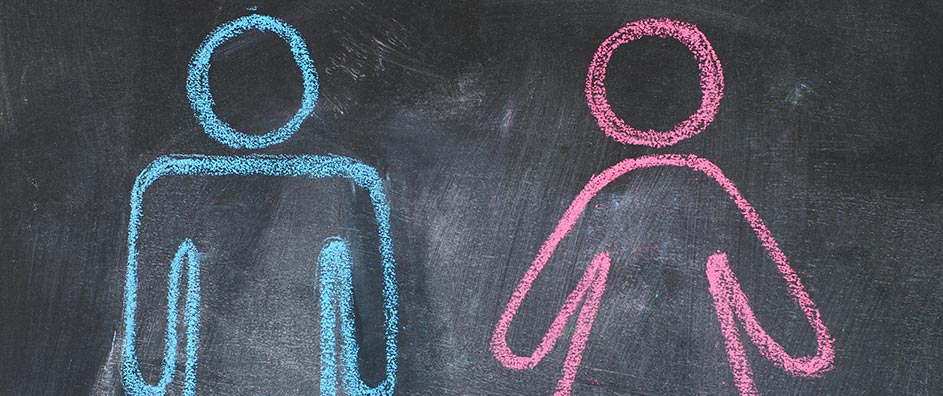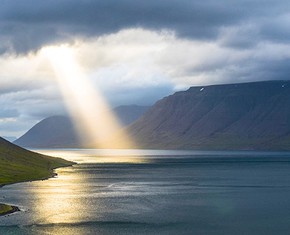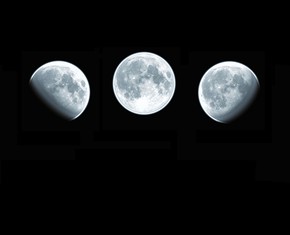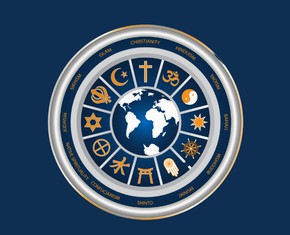The views expressed in our content reflect individual perspectives and do not represent the authoritative views of the Baha'i Faith.
When I grew up as a Christian child, God was a white guy (or so I imagined), up there in the sky somewhere, stroking his long, snow-white beard, deciding whether or not to grant my wishes, sent upstairs by my prayers. My primitive conception of God was something like Santa Claus, but with a moral agenda.
Eventually, after I became a Baha’i, I learned that God has no gender. Not only that, but God is beyond all human conception. Even believing that “God is one”—monotheism in its most perfect form–limits us in a sense, for God exists beyond singularity, and beyond all human understanding.
So, if God transcends gender, then why do we so often refer to God as “He”? Isn’t that tantamount to anthropomorphism — “Ascription of a human form and attributes to the Deity,” according to the Oxford English Dictionary?
Many “Tablets” (open letters) and prayers in Baha’i scripture, in fact, contain the phrase, “He is God!” Here’s an example:
He is God! O God my God! Bestow upon me a pure heart, like unto a pearl. – Abdu’l-Baha, Baha’i Prayers, p. 37.
Do these Baha’i texts ascribe gender to God? No, they don’t. Baha’i texts simply reference the gender of the Manifestation of God, or God’s messenger in human form. Jesus Christ was one such Manifestation of God. Jesus was a man, and, at the same time, a Man of God, the Supreme Being’s representative and reflection on Earth. In human form, obviously Jesus was male in gender. So was Baha’u’llah. But God is not male, except metaphorically, as the “Father.”
Dr. Nader Saiedi, Taslimi Professor of Baha’i Studies in the Department of Near Eastern Languages and Cultures at UCLA, explains that, according to an untranslated Tablet by Abdu’l-Baha (Mā’ida-yi Āsmānī, Vol. 9, p. 140), the expression, “He is God” primarily refers to Baha’u’llah, since God cannot truly be known or imagined otherwise. Any human conception of God must reflect an artifice of human imagination and, if worshipped as such, be tantamount to mental idolatry. Baha’is understand a “Manifestation of God,” as the theophany, or “appearance” of God, par excellence, in human form.
So do Baha’is think of Baha’u’llah, the founder and prophet of the Baha’i Faith, as God? And what about the other Prophets—Christ, Moses, Buddha, Muhammad? Abdu’l-Baha explains:
[Question to Abdu’l-Baha] Is the Divine Manifestation, God?
Yes, and yet not in Essence. A Divine Manifestation is as a mirror reflecting the light of the Sun. The light is the same and yet the mirror is not the Sun. All the Manifestations of God bring the same Light; they only differ in degree, not in reality. The Truth is one. The light is the same, though the lamps may be different; we must look at the Light not at the Lamp. – Abdu’l-Baha in London, pp. 66–67.
Okay. So “He is God!” refers to the “Light” of God, as shining in the “Lamp” of the Messengers and Prophets of God, in this case Baha’u’llah. Christians already understand this concept, as seen in the following biblical verse:
He that hath seen me [Jesus] hath seen the Father. – John 14:9.
 In other words, Baha’u’llah is “God” in nature, but not in essence. Baha’is believe that the Manifestations and Prophets of God reflect His glory to humanity. Since we can’t see or even imagine God, the next best thing is to see the light of God as it radiates from the perfect lamp, whether that source of spiritual illumination shines from Moses, Zoroaster, Buddha, Jesus, Muhammad, the Peacemaker, the Bab, or Baha’u’llah.
In other words, Baha’u’llah is “God” in nature, but not in essence. Baha’is believe that the Manifestations and Prophets of God reflect His glory to humanity. Since we can’t see or even imagine God, the next best thing is to see the light of God as it radiates from the perfect lamp, whether that source of spiritual illumination shines from Moses, Zoroaster, Buddha, Jesus, Muhammad, the Peacemaker, the Bab, or Baha’u’llah.
But let’s get back to the gender issue. Since Baha’u’llah was a man, as well as a “Manifestation of God,” it seems natural to refer to him as “He.”
“Yet,” according to Professor Saiedi, “the truth of Baha’u’llah is defined by Him as the feminine.” Astonished, I asked: “How could Baha’u’llah, a man, be feminine?” Professor Saiedi explained his reasoning and his source: “I found an unpublished Tablet of Baha’u’llah which says that this huriyyih [the “Maid of Heaven”] is the truth of Baha’u’llah.”
One of the celebrated “Maid of Heaven” passages first appears in Baha’i scriptures in the writings of Baha’u’llah’s forerunner, the Bab:
O Qurratu’l-‘Ayn! Let the Maid of Heaven, the inmate of the Exalted Paradise, drape Herself in a coarse vesture and put on a veil of the most beautiful silk. Then let Her step out of Her mansion, appearing by Herself, upon the earth, in the beauty of the black-eyed damsel. Let Her listen to the sweet praise out of Thy holy breaths upon the Seat of the Throne and in the celestial spheres, that haply those intoxicated and bewildered amongst the dwellers on earth may be awakened by Thy Cause, to an extent less than a single hair from the back of Her head, as ordained by God. God verily knoweth all things…
“O People of the earth! By the righteousness of the One true God, I am the Maid of Heaven begotten by the Spirit of Bahá, abiding within the Mansion hewn out of a mass of ruby, tender and vibrant; and in this mighty Paradise naught have I ever witnessed save that which proclaimeth the Remembrance of God by extolling the virtues of this Arabian Youth. Verily there is none other God but your Lord, the All-Merciful…
Return, O Thou Immortal Maid of Heaven, unto the holy Sanctuary within Thy Mansion. Thou wouldst receive Thy reward solely from Me, written down, verily, by Mine own hand in this Book through a single letter of My Command that hath been inscribed around the Fire. – Provisional translation by Nader Saiedi, Gate of the Heart, pp. 153–154.
I’ll explain who (or what) the “Maid of Heaven” is in my next article.
You May Also Like
Comments

















-"I give praise to Thee, therefore, O my God, that Thou hast preserved them that have acknowledged Thy unity, and hast destroyed them that have joined partners with Thee, and hast divided the one from the other through yet another word that hath proceeded out of the mouth of Thy will, and flowed down from the pen of Thy purpose." (Prayers and Meditations by Baha'u'llah, p. 308)
-"The people aforetime joined partners with God, though they professed belief in His unity; and although they were ...the most ignorant amongst men, they considered themselves the most accomplished" (Tablets of Baha'u'llah, p. 124)